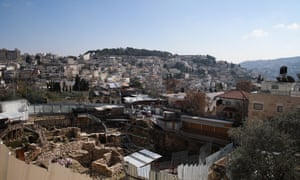Israel using tourism to legitimise settlements, says EU report
Exclusive: European Union Heads of Mission warn ‘touristic settlements’ are being used as a political tool
 Israel is developing archaeological and tourism sites to legitimise illegal settlements in Palestinian neighbourhoods of Jerusalem, European Uniondiplomats in the city have warned.
Israel is developing archaeological and tourism sites to legitimise illegal settlements in Palestinian neighbourhoods of Jerusalem, European Uniondiplomats in the city have warned.
A leaked report acquired by the Guardian cited projects in parts of East Jerusalem – occupied by Israel since 1967 – that are being used “as a political tool to modify the historical narrative and to support, legitimise and expand settlements”.
The report identified settler-run excavation sites in the heart of majority-Arab districts, a proposed cable car project with stops on confiscated land and the designation of built-up urban areas as national parks.
“East Jerusalem is the only place where Israeli national parks are declared on populated neighbourhoods,” the report said.
The document, a report written annually by the EU Heads of Mission in Jerusalem, presented a bleak picture, saying the overall situation in the city and the prospects for peace had worsened.
Marginalisation of Palestinians, who comprise about 37% of the city’s residents, continued unabated, with more than 130 building demolitions and the displacement of 228 people, it said.
A record number of Israeli settlement proposals and the physical isolation of Palestinians under a strict Israeli permit scheme meant “the city has largely ceased to be the Palestinian economic, urban and commercial centre it used to be”.
Archaeology and tourism development by government institutions as well as private settler organisations established what it said was a “narrative based on historic continuity of the Jewish presence in the area at the expense of other religions and cultures”.
Chief among them, the report warned, was the City of David, a government-funded archeological park in the Palestinian neighbourhood of Silwan that provides tours in the ruins of ancient Jerusalem.
The site is operated by a settler organisation “promoting an exclusively Jewish narrative, while detaching the place from its Palestinian surroundings”.
Approximately 450 settlers live under heavy protection in Silwan, the report said, alongside almost 10,000 Palestinians. Continued evictions of Palestinian families and the increased Israeli security presence have created a particular tension, it warned.
More recently, a cable car project approved by the Israeli cabinet in May plans to connect West Jerusalem with the Old City, part of Jerusalem internationally recognised as occupied.
Expected to be operational in 2020 and aiming to transport more than 3,000 people per hour, the report warned the “highly controversial” plan would contribute to the consolidation of “touristic settlements”. The project also aims, in a second phase not yet approved, to extend further into East Jerusalem.
“Critics have described the project as turning the World Heritage site of Jerusalem into a commercial theme park while local Palestinian residents are absent from the narrative being promoted to the visitors,” it said.
In addition, the diplomats warned, the cable car could lead to a deterioration of the security situation, as it would be located about 130 metres from the Temple Mount/Haram al-Sharif complex, revered as a holy site by both Muslims and Jews.
This summer, gunmen killed two Israeli police officers at the entrance to the site, and the subsequent installation from authorities of metal detectors led to further clashes.
Geen opmerkingen:
Een reactie posten
Opmerking: Alleen leden van deze blog kunnen een reactie posten.